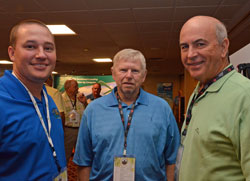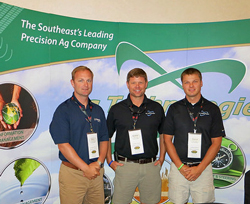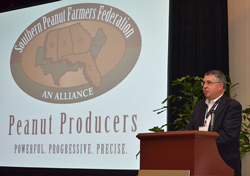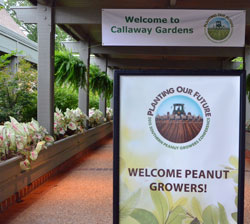 The location is new this year but the 17th annual Southern Peanut Growers Conference has the same great line up of information and entertainment for peanut farmers and industry partners from Alabama, Florida, Georgia and Mississippi.
The location is new this year but the 17th annual Southern Peanut Growers Conference has the same great line up of information and entertainment for peanut farmers and industry partners from Alabama, Florida, Georgia and Mississippi.
Conference registration kicked off as usual with grilled PB&J sandwiches sponsored by the National Peanut Buying Points Association and ice cream with lots of peanut toppings.
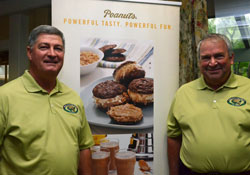 Also as usual, we started off the event by talking to the executive directors of the states that make up the Southern Peanut Farmers Federation, starting with Ken Barton of the Florida Peanut Producers Association and Don Koehler with the Georgia Peanut Commission.
Also as usual, we started off the event by talking to the executive directors of the states that make up the Southern Peanut Farmers Federation, starting with Ken Barton of the Florida Peanut Producers Association and Don Koehler with the Georgia Peanut Commission.
For the first time in 17 years, Georgia is the host state for the event that has always been held in Panama City Beach, Florida. “It’s a little bit of a breath of fresh air,” says Koehler of the new location in Pine Mountain. There is lots more to do at Callaway Gardens, from hiking the cool mountain trails to checking out the butterfly center – and they even have a beach! “Actually Callaway Gardens has the largest man-made beach in North America,” Koehler says.
In this interview, Don also talks about this year’s peanut crop and issues of importance to farmers:  Interview with Don Koehler, Georgia Peanut Commission (MP3)
Interview with Don Koehler, Georgia Peanut Commission (MP3)
Conversely, it is the first time that Florida has not hosted the conference and Barton says attendees will have the opportunity this year to determine the future for where the event will be held. “We may not have a permanent home, it may be that we move from state to state,” said Barton. “One of the sessions will include a survey that asks our farmers what they would like to do.”
Both Georgia and Florida can lay claim to the big name speakers at this year’s conference. Deputy Secretary of Agriculture Krysta Harden, a Georgia native, will give the keynote address during the Friday luncheon sponsored by BASF, and Congressman Ted Yoho (R-FL) will speak to attendees on Saturday morning.
Listen to my interview with Ken here:  Interview with Ken Barton, Florida Peanut Producers Association (MP3)
Interview with Ken Barton, Florida Peanut Producers Association (MP3)
Check out the photo album link below for photos updated regularly throughout the conference.
2015 Southern Peanut Growers Conference Photo Album
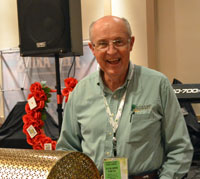 The peanut crop in Mississippi overall looks real good, but Mississippi Peanut Growers Association executive director Malcolm Broome says there are a few problem areas. “Couple areas in the state were too wet and got late planting and then it went dry and got 100 degree days, but in the last week we’ve gotten rain all across the state so crop should be coming on okay,” he said.
The peanut crop in Mississippi overall looks real good, but Mississippi Peanut Growers Association executive director Malcolm Broome says there are a few problem areas. “Couple areas in the state were too wet and got late planting and then it went dry and got 100 degree days, but in the last week we’ve gotten rain all across the state so crop should be coming on okay,” he said. Interview with Malcolm Broome, Mississippi Peanut Growers Association (MP3)
Interview with Malcolm Broome, Mississippi Peanut Growers Association (MP3)
